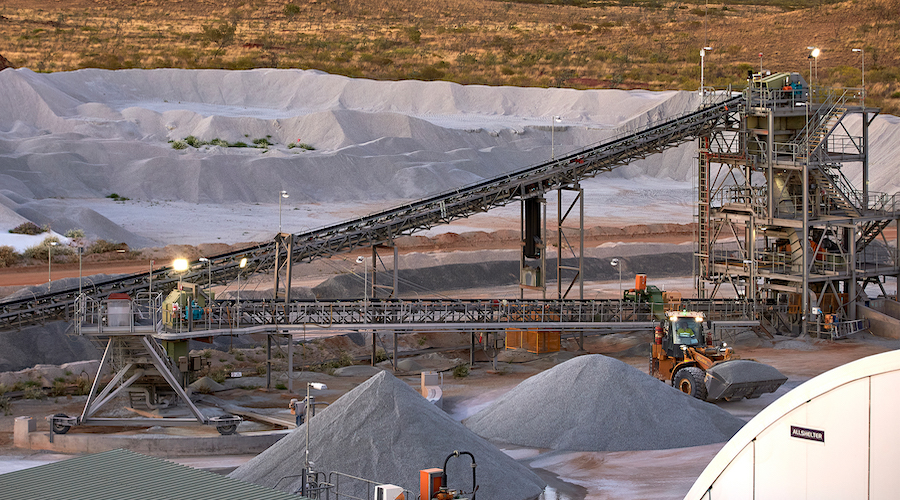Bloomberg News | March 25, 2024 |

BHP CEO Mike Henry (Credit: BHP)
China’s steel industry is young compared to Europe’s, and its transition to net zero may be slower as it takes a different path to reach government-mandated decarbonization goals, according to BHP Group Ltd.’s chief executive officer Mike Henry.

While certain unique factors have led European steelmakers to make faster plans to carbon neutrality, China may be at a disadvantage in the global race to remove carbon from heavy industry because its blast furnaces are younger and not due for retirement anytime soon, Henry said in remarks prepared for delivery at the China Development Forum in Beijing on Sunday.
Steel making accounts for roughly 8% of global carbon dioxide emissions. China produces approximately 50% of the world’s steel, with a goal to replace 15% of its output with electric arc furnaces by 2025.
Europe is replacing its traditional coal-fired blast furnaces with electric arc furnaces and recycling vast reserves of scrap steel, Henry said. China however is continuing to add steel on a net basis, meaning the availability of scrap is low.
“Given younger, less carbon intensive blast furnaces, and less scrap availability, Chinese steelmakers are understandably looking at continuing to use these assets rather than replacing them earlier than otherwise would be the case,” the top executive of the world’s biggest miner said.
Manufacturers in China are showing their commitment by using technologies such as hydrogen injection, and carbon capture, utilization and storage to offset rising amounts of greenhouse gas emissions, he said, adding BHP is supporting such efforts through several partnerships.
“China’s willingness to open up to the world, and the world’s willingness to work with China” is integral to the future of energy, he said.
(By Paul-Alain Hunt)
China’s top miner says it ‘will be targeted’ amid US risks
Bloomberg News | March 25, 2024

Tibet. (Image by Göran Höglund (Kartläsarn), Flickr).
Zijin Mining Group Co., one of China’s most acquisitive metals groups and its biggest listed miner, warned that US-led efforts to tackle Beijing’s control of minerals could slow the company’s global expansion, warning that geopolitical tensions are “becoming increasingly grim”.

The attempted containment of China by developed nations was now commonly understood, and Zijin “will be targeted for sure” given its leading role in the industry and plans for more acquisitions, Chairman Chen Jinghe said on a media call on Monday. “The development of the Chinese economy and the Chinese mining industry is becoming more difficult,” he added.
Beijing’s dominant role in mining supply chains — especially in “critical minerals” vital in industries from electric vehicles to military hardware — has led the US and European Union to push for greater reliance on materials produced domestically or by friendly nations. That poses a risk to the growth of Zijin, which has bought copper and gold mines from Canada to Africa, and expanded into lithium in a bid to become a key player in the battery material.
Chen’s comments came after Zijin said on Friday that it planned to ramp up output of all its metals by 2025 through major acquisitions, including of “ultra-large mines or mining companies with global influence.” The company will remain active in its global development, despite “geopolitical tensions becoming increasingly grim,” Chen said Monday.
Zijin also delivered an outlook for its major commodities in its annual results. Here are some of the key comments:While gold is getting support from central-bank buying, the upside could be capped if the US economy achieves a “soft landing”. Uncertainty over the pace and magnitude of Federal Reserve cuts will drive volatility.
Copper will “continue to exhibit significant fluctuations” amid global supply disruptions and uncertainty over demand from key sectors including autos and real estate in China, or in regions including the US and Europe
The global zinc market is expected to be tightly balanced, and mining costs will support a bottom for prices
Lithium producers are already responding to low prices for the battery material by cutting supply, and lithium should have strong support at about 100,000 yuan a ton. That’s just below recent prices.

Tibet. (Image by Göran Höglund (Kartläsarn), Flickr).
Zijin Mining Group Co., one of China’s most acquisitive metals groups and its biggest listed miner, warned that US-led efforts to tackle Beijing’s control of minerals could slow the company’s global expansion, warning that geopolitical tensions are “becoming increasingly grim”.

The attempted containment of China by developed nations was now commonly understood, and Zijin “will be targeted for sure” given its leading role in the industry and plans for more acquisitions, Chairman Chen Jinghe said on a media call on Monday. “The development of the Chinese economy and the Chinese mining industry is becoming more difficult,” he added.
Beijing’s dominant role in mining supply chains — especially in “critical minerals” vital in industries from electric vehicles to military hardware — has led the US and European Union to push for greater reliance on materials produced domestically or by friendly nations. That poses a risk to the growth of Zijin, which has bought copper and gold mines from Canada to Africa, and expanded into lithium in a bid to become a key player in the battery material.
Chen’s comments came after Zijin said on Friday that it planned to ramp up output of all its metals by 2025 through major acquisitions, including of “ultra-large mines or mining companies with global influence.” The company will remain active in its global development, despite “geopolitical tensions becoming increasingly grim,” Chen said Monday.
Zijin also delivered an outlook for its major commodities in its annual results. Here are some of the key comments:While gold is getting support from central-bank buying, the upside could be capped if the US economy achieves a “soft landing”. Uncertainty over the pace and magnitude of Federal Reserve cuts will drive volatility.
Copper will “continue to exhibit significant fluctuations” amid global supply disruptions and uncertainty over demand from key sectors including autos and real estate in China, or in regions including the US and Europe
The global zinc market is expected to be tightly balanced, and mining costs will support a bottom for prices
Lithium producers are already responding to low prices for the battery material by cutting supply, and lithium should have strong support at about 100,000 yuan a ton. That’s just below recent prices.
Pilbara Minerals, Ganfeng agree to study for lithium chemical plant
Reuters | March 24, 2024 |

Pilgan plant at the Pilgangoora lithium operation. (Image courtesy of Pilbara Minerals.)
Australia’s Pilbara Minerals has agreed to a study with Chinese customer Ganfeng Lithium on options to build a 32,000 metric-ton-per-year lithium conversion facility in a country yet to be decided, the companies said on Monday.

The feasibility study for the plant that could produce lithium carbonate or hydroxide is expected to be completed in the March quarter of 2025.
The parties are considering a number of locations for a plant, including Australia, to explore greater geographical diversification in the battery chemicals supply chain, the country’s biggest independent lithium miner said in an exchange filing.
Pilbara Minerals already has a joint stake with South Korea’s POSCO in a lithium hydroxide plant and a tie-up with Calix Limited for the construction of a midstream lithium chemicals demonstration plant in Western Australia.
The study will also include the potential production of a midstream lithium chemicals product to help cut transportation volumes and the carbon footprint.
Pilbara Minerals seals another Chinese offtake deal
“Preliminary engagement with several countries has indicated strong interest in establishing lithium chemical production with potential economic, taxation and funding incentives on offer, together with access to land and offers of assistance with permitting and approvals,” the Pilbara Minerals filing said.
If the joint venture proceeds, the parties intend to own the project 50:50, but Ganfeng is open to selling down its stake, depending on potential benefits from the US Inflation Reduction Act subsidy scheme that has US sourcing requirements, the companies said.
Pilbara Minerals is expanding production to 1 million tonnes of spodumene a year. It has committed to supply 300,000 tons of spodumene a year for the project via a 15-year offtake agreement if it goes ahead.
If a final investment decision fails to secure approval, Pilbara will supply an extra of 100,000 tons of spodumene to Ganfeng Lithium on an annual basis from 2027 to 2030, on top of the existing offtake agreement, Ganfeng Lithium said in a filing to the Shenzhen Stock Exchange on Monday.
It will in the June quarter decide whether to expand production capacity beyond 1 million tonnes a year, it said in the statement.
(By Melanie Burton and Amy Lv; Editing by Tom Hogue, Jamie Freed and Louise Heavens)
No comments:
Post a Comment